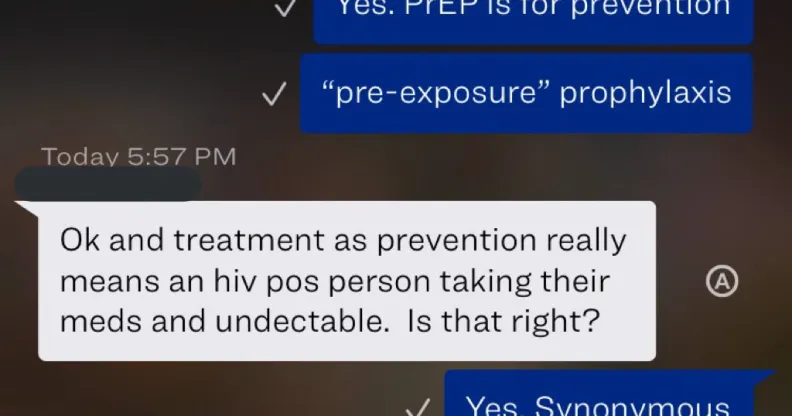This negative guy schooling people about HIV on Scruff is a breath of fresh air

A HIV educator had a constructive chat over Scruff with someone unclear about some HIV facts, and it’s eye-opening. (Twitter)
A negative guy educated a man he met on Scruff about HIV, clarifying some common misconceptions, and Twitter is taken aback by how well it went.
Grant, an HIV educator from New York, US, shared on Twitter screenshots of a Scruff conversation where he informed the user about what it means to live with HIV and be undetectable.
Considering how people living with HIV have opened up about the discrimination and ignorance they face on dating apps, many Twitter users took the chat as a breath of fresh air.
Speaking to PinkNews, Grant gave the low-down on the exchange and encouraged people to base their sexual decisions “on science, not stigma”.
HIV educator: ‘My hope is that people’s sexual decisions are based in science, not stigma.’
“The topic of HIV came about while discussing our sexual practices,” Grant said.
It might be Scruff, but there’s always a good opportunity for HIV education 🤓 pic.twitter.com/w0lRftHQO6
— grant👨🏻🦱 (@urdadssidepiece) October 8, 2019
“He made some comment that came across as if he would change his (lack of) condom use based on HIV status, so I inquired about it.”
As the screenshots show, Grant and the user hashed out any gaps of knowledge the user had around HIV, especially on the confusion that surrounds exactly what being HIV undetectable means.
“When he said he would use a condom with someone who was HIV-positive but not with someone who was negative, I decided that would be a good opportunity to discuss the double standard and the undetectable=untransmittable principle.”
Many HIV advocates and healthcare providers have been involved in the ‘Undetectable = Untransmittable’ campaign in an effort to curb the stigma that those living with HIV experience.
The slogan is simple: When someone is HIV-positive, on medication and consistently undetectable, this means there’s zero risk of them passing on the virus during sex, with or without protection.
Grant added: “My hope is that people’s sexual decisions are based in science, not stigma.
“I was happy his response was positive, because people can be really combative online and especially when they get a health lesson they didn’t ask for.
“Apps like Scruff are perfectly situated for HIV education in various capacities. I’m glad I could engage in a respectful and productive conversation with him.”
‘First time I see one of these conversations actually go well’: Twitter in shock at a teachable moment gone right.
After posting pictures on his Twitter, many users expressed their disbelief.
“First time I see one of these conversations actually go well,” said Simon, a software engineer.
Others praised Grant for taking the time to educate the user: “You’re doing the lord’s work.”

PrEP (Justin Sullivan/Getty)
The tweet quickly turned into a Q&A thread, where Grant continued to clarify crucial things about HIV, and emphasised to PinkNews how giving people a space to learn can make a difference.e
“There have definitely been times I’ve jumped to anger over a stigmatising statement without assessing level of HIV education first,” he explained.
“Knowledge is not as widespread as it should be,” Grant said.
Points were made: ‘People living with HIV shouldn’t be the only ones doing the education!’
Grant’s masterclass on Scruff is something he actively encourages – whether from his Twitter following or people he encounters on apps.
He admitted that while information on HIV is readily available with a swift keyboard tap and Google search, “It can be difficult to determine what’s reliable, and people don’t know where to start.”
Asking a healthcare provider about PrEP, about U=U, about what undetectable means – this can all be intimidating to some, Grant said, and can put people off from asking questions.
And crucially, Grant added: “People living with HIV shouldn’t be the only ones doing the education!
“I can usually do a good job detecting when someone might hold stigmatising beliefs about HIV based on what they say to me online,” he added.
“When this happens, I tend to probe a bit and then see if I can engage in a conversation about HIV prevention/treatment, like I did in this instance.”
Stigma surrounds HIV – a condition historically haunted by the legacy of the AIDS crisis in the 80s – as thousands today contend with discrimination from those not fully understanding of what it means to live with the disease.
HIV activists and experts have long stressed that medical leaps in HIV-preventative drugs – such as PrEP and PEP – has radically curbed acquisition rates as well as making the disease manageable.
Nevertheless, stigma has persevered. Sometimes strained by a lack of governmental cooperation with HIV advocacy organisations to promote regular testing and increase access to the drugs to demographics statistically more at risk.

